It’s been a few years since I stepped down from my role as director of programming at DOXA Documentary Film Festival. I’d almost forgotten what it’s like to watch a whole whack of documentaries in a short space of time. It does something odd to one’s brain.
DOXA Documentary Film Festival launches this week, and Hot Docs in Toronto has been running since last Thursday. The films are flowing thick and fast.
Why do documentaries matter? I could blather on about stories that are rarely told in more mainstream media, but the thing that has always been central to the programming ethos of DOXA is the art of documentary. These films aren’t the stuff of reality TV or Netflix binges. They’re singular, extraordinary acts of creative storytelling, filled with complexity, emotion and often ravishing beauty.
Here are just a few suggestions to help you slip into the documentary waters.
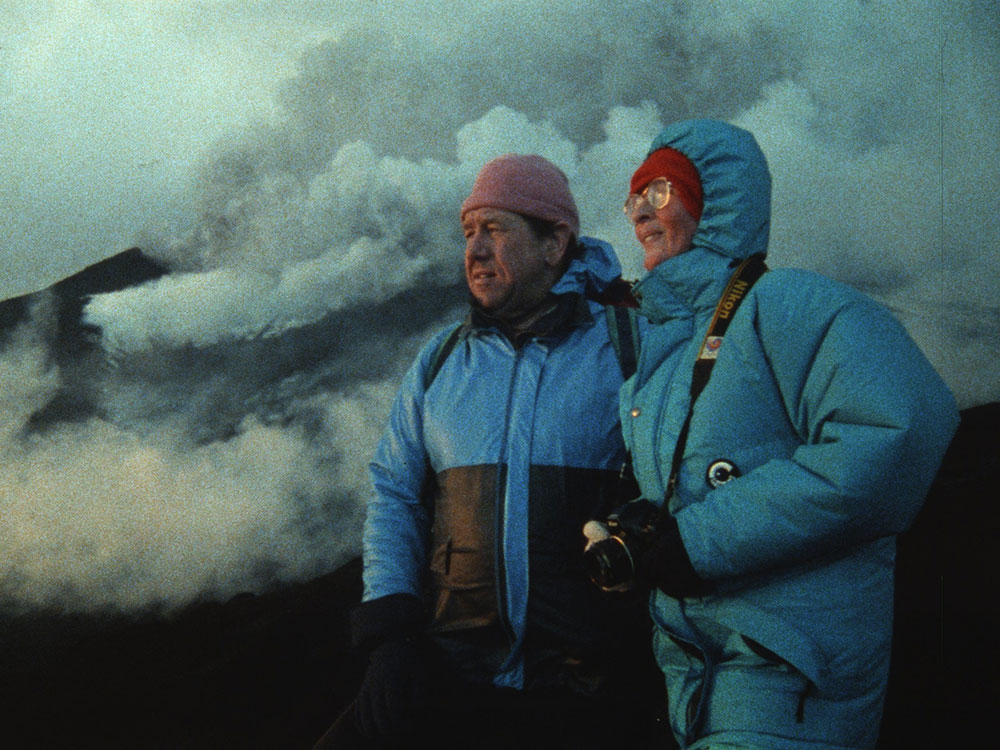
Fire of Love (Canada/US, 2022)
Katia and Maurice Krafft are a pair of French scientists who met, fell in love, got married, and went on to shape how the world understands its point of origin, namely in the molten core of superheated liquid rock moving beneath our feet.
Fire of Love opened the Sundance Film Festival, picked up the Jonathan Oppenheim Editing Award and is also DOXA’s opening night offering. Narrated by Miranda July, whose voice adds another level of eccentricity to the proceedings, director Sara Dosa’s film is populated with unbelievable footage of the Kraffts in action. Beginning in 1966, the pair circled the globe, beetling to wherever the action was hottest, from Iceland to Japan, Zaire to Columbia. Dressed in matching fireproof silver suits, silhouetted against electric orange lava flows, they dance at the very edge of destruction, giddy as school children. Riveting doesn’t quite do it justice. It is chin-dropping stuff.
As the film makes evident, the fact that these two people, born in the same part of France, sharing a mutual obsession, would meet and combine forces seems almost fated to be.
The couple’s imminent death is clear from the outset. The story begins with the lines, “It’s 1991. June 2. Tomorrow will be their last day.” When the couple got word that Mount Unzen in Japan had started to make ominous rumbles, they immediately made their way there to document the action. That this would be the end of them is sad, but also somehow not. They died as they lived, together, doing exactly what they loved. We should all be so lucky.
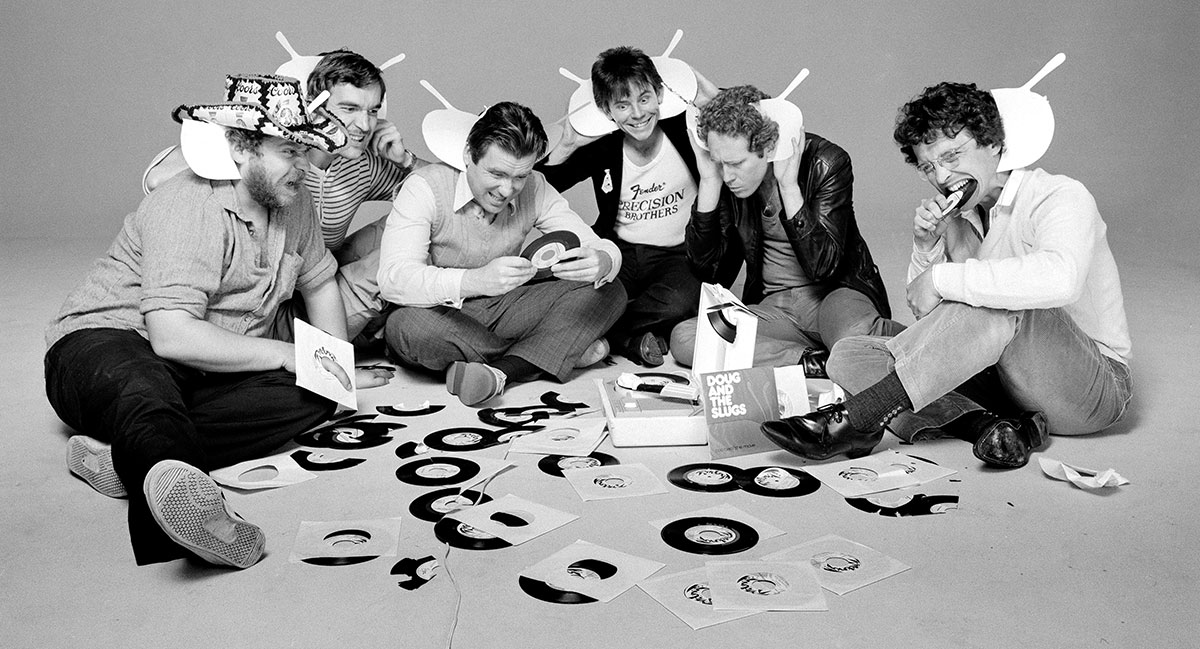
Doug and the Slugs and Me (Canada, 2022)
As a kid growing up in East Vancouver, Teresa Alfeld and family lived right next door to the Bennetts: Doug, his wife Nancy and their three daughters. As she says in the film, she was mostly familiar with Doug Bennett as the somewhat goofy dad of her childhood friend Shea. “I knew that Doug was in a band, he’d go on tour every summer but that’s all I really knew about him.” Making a documentary changed this.
For those who didn’t come of age with the music of Doug and the Slugs, in short, the band made their name and reputation on the basis of poppy songs like “Too Bad” and “Making it Work,” radio hits with a heavy dose of wit and wordplay. Doug Bennett, who resembled a slick '30s movie star mixed with a door-to-door encyclopedia salesman, made for a memorable frontman.
Alfeld’s decidedly personal take on Vancouver’s favourite musical sons is pretty hard to resist. Beneath a deeply affectionate tribute to the man and the music is something more complex — namely, what happens when dreams don’t work out.
Following Doug’s untimely death at age 52 in 2004, there were a lot of unanswered questions. The film explores the stuff of Bennett’s personal journals, which detail his fears, ambition and conflicts with his fellow band members. It is an intimate view into a complex, and often troubled person. When Bennett passed away, years of hard drinking and disappointment may have been at the root of his death. The loss reverberates still, a radioactive core comprised of grief and love.
The thing that most resonates from the film is the quality of the music. I hadn’t really listened to the band since they first emerged in the 1980s, and the emotional nuance and often surprising gravity of Bennett’s lyrics was a revelation.
Sirens (Lebanon/US, 2022)
The travails of an all-female death metal band in Lebanon make up the meat of Rita Baghdadi’s film. That alone would be enough for many films, but Sirens also packs in a poignant look at the nature of young love, as well as the intricacies of making art in a country roiling with violence.
Creative and romantic relationships are hard at the best of times. Add in the dynamics of a rock band, and you get pyrotechnics that would put a Kiss concert to shame. As founders of the group Slave to Sirens, Lilas Mayassi and Shery Bechara are young, queer and freighted with ambition. The two metalheads are an incendiary duo, committed to making music in the face of trollish insults, political upheavals and even a massive explosion that destroyed large sections of the Port of Beirut in 2020.
When they’re not fighting or pining for each other, the pair are laying down crunchy guitar riffs and aiming to change the world with their growled lyrics. The band appears poised on the edge of genuine stardom — if they can keep it together, that is.
Produced by Natasha Lyonne and Maya Rudolph’s Animal Pictures, the film has style, as well as substance to burn. But more importantly, the narrative frontlines the power and resiliency of young women to find ways forward, in love and art.
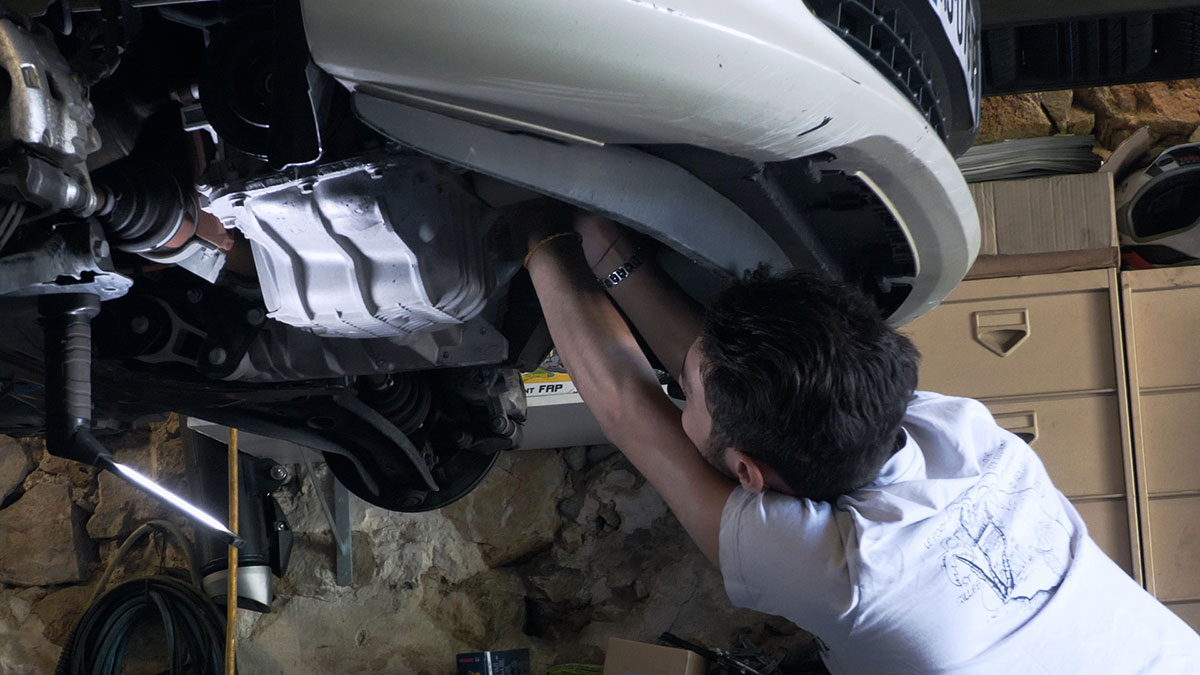
Garage, Engines and Men (France, 2021)
There is nothing that I find more boring in the entire world than men fixing cars. Trust the one and only Claire Simon to change that. Garage, Engines and Men (Garage, des moteurs et des hommes) finds the filmmaker returning to the place of her youth, the small Provençal village of Claviers, in the Haut Var region of France.
The town is in the midst of a slow decline. Most of the residents are either elderly or part-time vacationers. Stores and businesses are closed. It’s a somnolent, quiet place, slowly sinking into the surrounding hillsides. The only action-packed spot in town is the local garage. As Simon says, by way of introduction, “whatever you do, you need a car, so the garage is the place where everyone goes."
The place is bustling, with a steady stream of folks showing up to have their cars and motorcycles attended to or just to shoot the shit with the owner of the shop, Christophe Scalia. A sharp-eyed and even sharper-tongued dude, Scalia oversees the shop like a genial curmudgeon, bossing around his young apprentice, joking with the locals, and generally being larger-than-life character, a fact further reiterated by the ringtone on his phone, the theme from The Godfather.
As the men fight with recalcitrant vehicles, small dramas spill over. They’re layered in minute expressions, blue language and the easy camaraderie of men who have worked together for a while. It all adds up to an intimate and utterly charming portrait of a place, its people and their cars.
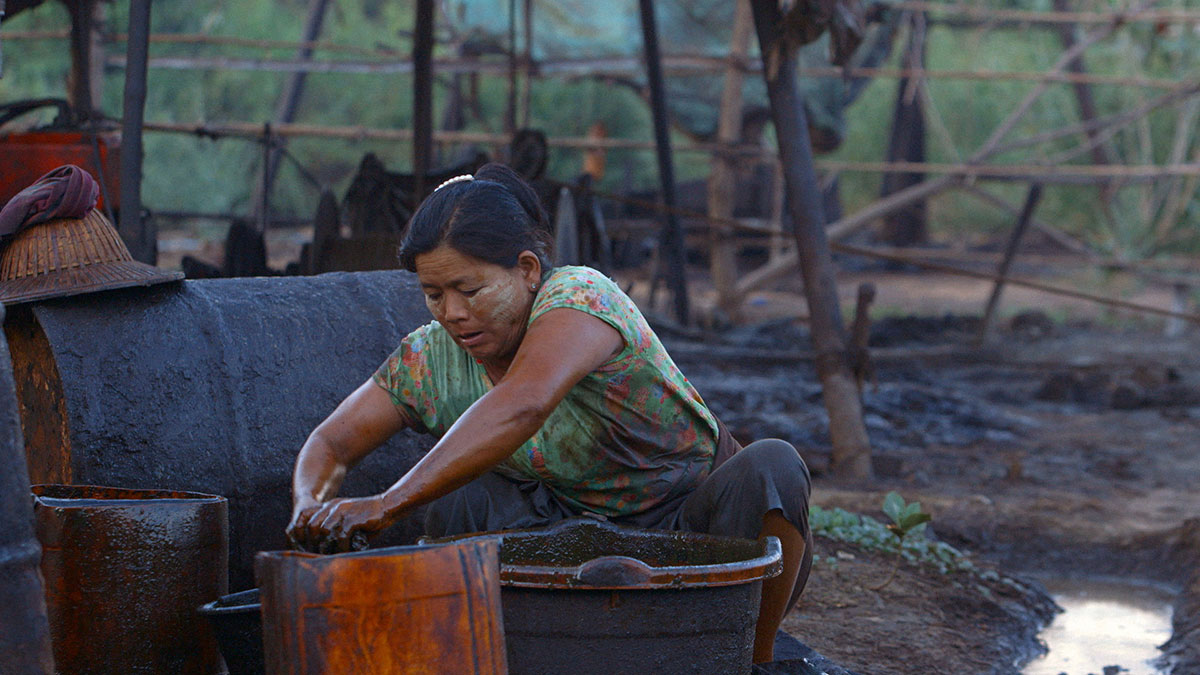
A Thousand Fires (France/Netherlands/Palestine/Switzerland, 2021)
The term observational documentary can occasionally be shorthand for 90 minutes where nothing much happens. On the surface of things, Saeed Taji Farouky’s film A Thousand Fires documents the ordinary days of Thein Shwe, his wife Htwe Tin, and their kids in rural Myanmar. The couple operates a small oilfield, drawing a living from what they manage to crank out of the earth by hand. It is a dirty, mucky business, but also studded with a startling amount of beauty.
The Magway region is home to thousands of these operations, hence the film’s title. The artisanal oil business lured the couple away from the traditional practice of subsistence farming with the promise of more money. Their youngest son wants to play soccer, and the family is eager to find a way forward to a better life.
A masterpiece of tone and ambiance, as well a luminous portrait of one family, Farouky’s film is as elegantly constructed as a symphony. The scenes of snaking muddy hoses and the serpentine slick of oil on water set against the chuffing thud of engines are strangely mesmerizing. The colours, patterns and sounds are so richly immersive and beautiful that it’s easy to forget that what you’re witnessing is grinding poverty in action.
It is the dignity of the people at the centre of the film that is most resounding. Whether crooning a lullaby to their deliciously chubby new granddaughter or working the red earth to eke out an existence, they are indelibly embedded in heart and mind.
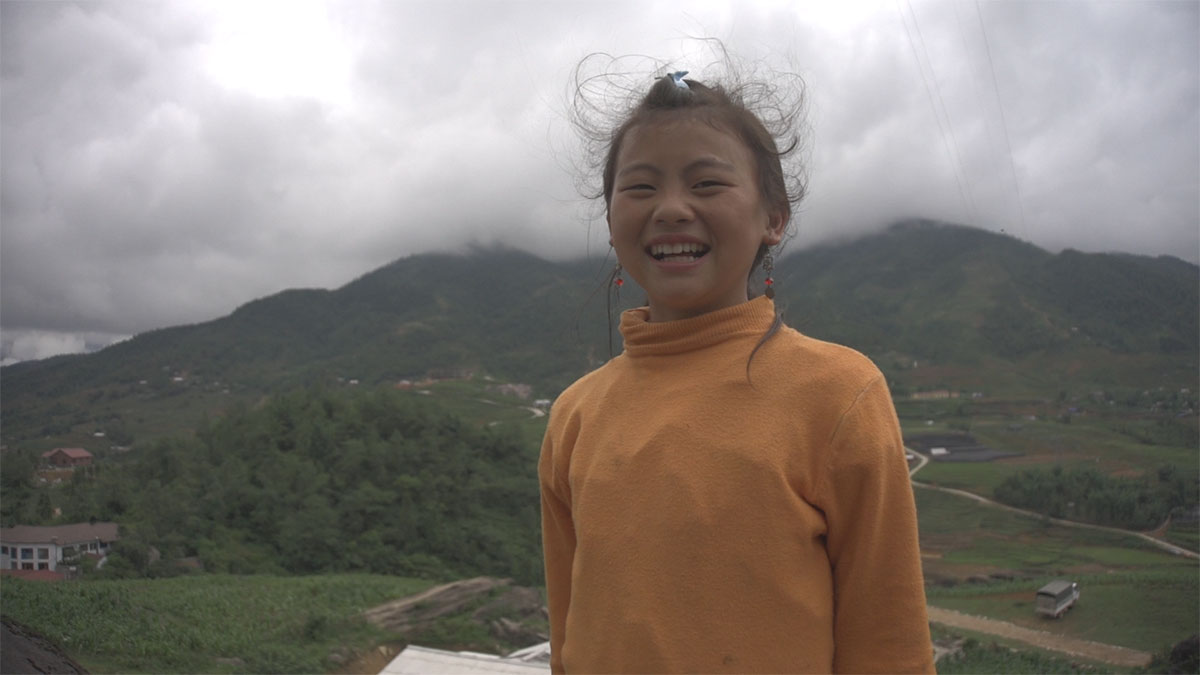
Children of the Mist (Vietnam, 2021)
Another rich slice of life takes place on camera in director Hà Lệ Diễm’s riveting documentary. Set in a remote section of Vietnam among the Indigenous Hmong people, the bulk of the narrative is carried on the slender shoulders of a 12-year-old girl named Di.
At an age when most pre-teens are thinking about school, friends and budding romantic relationships, Di is having to contemplate marriage. In the traditional practice of bridal kidnapping among the Hmong, girls are often abducted by young men and their families. If not found in time by their own families, the kidnapped women are forced to marry their abductors. Both Di’s mother and her sister were subjected to the practice. At age 17, Di’s older sister La was carried off and is currently pregnant with her second child. In a great many documentaries, one can be forgiven for forgetting that a filmmaker is even present, but this isn’t the case with Children of the Mist, where the director is often hauled bodily into the action.
Made over the course of three years, the film catches the fraught transition between childhood and maturity, as Di attempts to navigate not only the changes in her community but also within herself.
The siren call of the outside world is always filtering in, mostly through ubiquitous cell phones and social media. Umbilically attached to her phone, Di keeps careful tabs on the local boys, flirting and fighting with them. As older traditions clash, sometimes violently, with more contemporary ideas, the deeply divergent notions on what it means to become a young woman become clear.
Di’s need to remain true to her own needs imbues the film with heartbreaking drama. The pressure and pains of incipient adulthood are instantly relatable. As Di says to the camera, “I wish I could be a child again.”
Alain Cavalier Forever!
One of DOXA’s special curated programs Grand-mère. Grandmother. Babushka takes its inspiration from older women.
As curator Laurence Reymond writes: “I have a strong belief that an older woman in a film tends to immediately resonate as a ‘grandmother figure’ for the viewer. That’s how it works for me: she might be terrible and angry, totally off the wall, or sweet and soft spoken — there’s always a certain recognition.”
In amongst the feature-length and short films including Chantal Akerman’s No Home Movie, Alexandra Ramires and Laura Goncalves’s Drop by Drop (Água Mole), Naomi Kawase's Ten, Mitake, Barbara Hammer’s My Babushka: Searching Ukrainian Identities and Stéphane Riethauser’s Madame, there is a short from Alain Cavalier, drawn from his inaugural series of portrait films.
The portraits document women who work with their hands, whether that’s as a florist, a mattress maker, a washroom attendant or a close-up magician. The Illusionist is one Antoinette, an ebullient, sparky woman whose feats of magic are almost as charming as the lady herself. At 86 and a half, Antoinette has led a life of love, laughter and, well, magic. Performing for the filmmaker in a satin top hat and a wicked grin, she talks about her life, childhood, marriage, love and joy. It is a pure happiness to watch her in action.
That’s only a trickle of what’s on offer at DOXA this year. There’s a river, a sea, an ocean of films. Dive in, splash about, the water is fine!
DOXA Documentary Film Festival is running online and in person from May 5 to 15. ![]()
Read more: Film



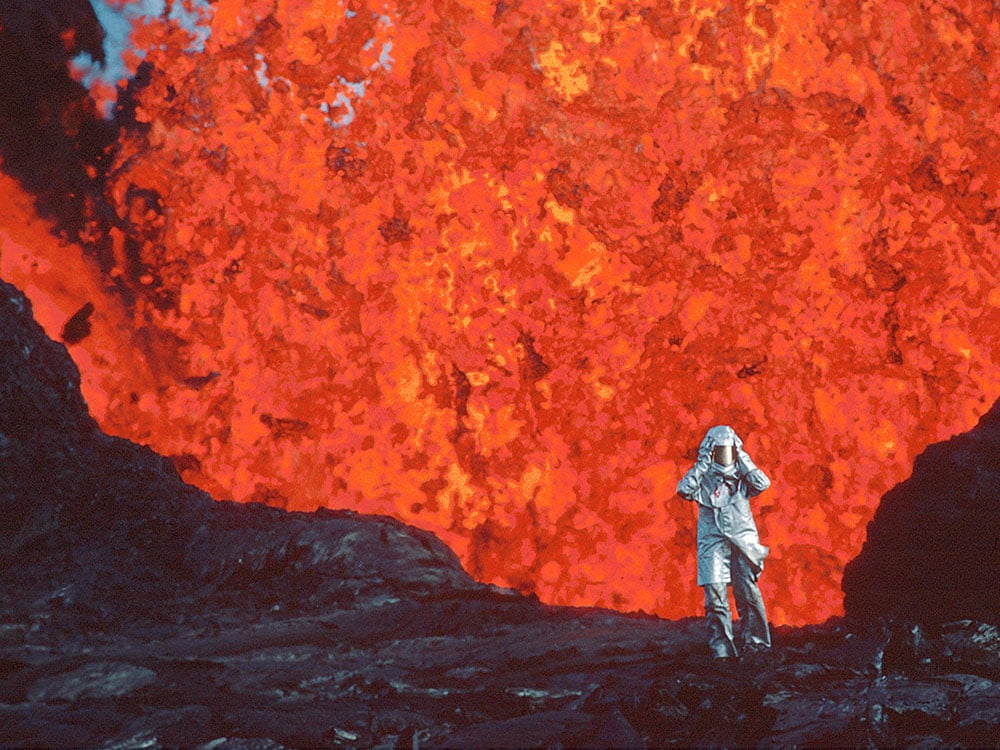












Tyee Commenting Guidelines
Comments that violate guidelines risk being deleted, and violations may result in a temporary or permanent user ban. Maintain the spirit of good conversation to stay in the discussion.
*Please note The Tyee is not a forum for spreading misinformation about COVID-19, denying its existence or minimizing its risk to public health.
Do:
Do not: